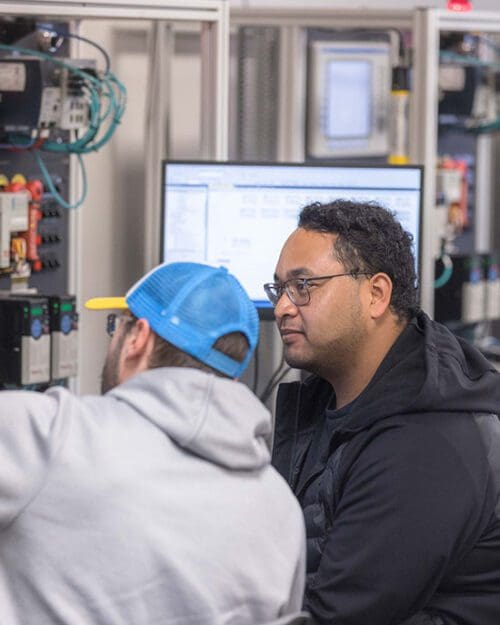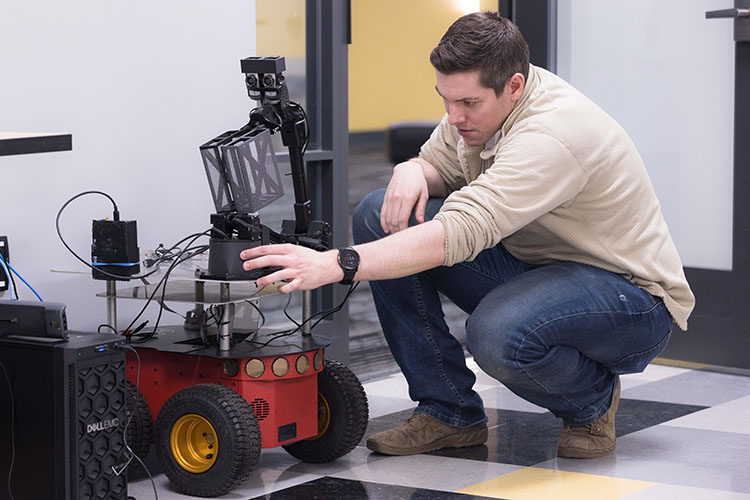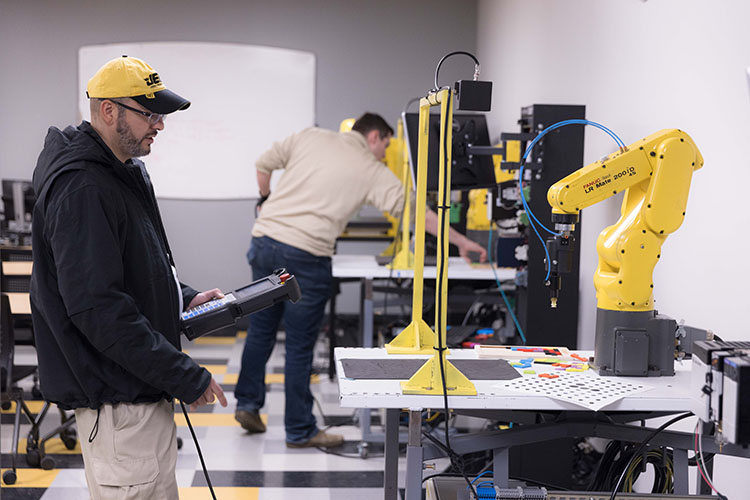PNW’s Mechatronics Engineering Technology program sets graduates up for success

The Mechatronics Engineering Technology program in the College of Technology at Purdue University Northwest is a multidisciplinary program designed to equip students with a diverse skill set tailored to meet the demands of modern industry and make them highly sought after by employers.
Mechatronics, a relatively new concept, was established by the Japanese in the 1960s. The field was born out of necessity and the realization that the complexities of modern day automation required a holistic approach that seamlessly integrated several diverse disciplines.
Mechatronics engineering technology (MCET) combines mechanical and electrical engineering with control systems and software technology. It blends aspects of mechanical design, mathematical modeling, manufacturing, electrical controls, automation and robotics to help create more innovative and efficient processes in the manufacturing industry.
Unlike traditional engineering or technology degrees, MCET offers a unique blend of theoretical knowledge and hands-on experience giving students the tools needed to become adept problem solvers and innovators in the field.
A synergistic approach
“What sets our program at PNW apart is its holistic approach,” says Maged Mikhail, interim associate department chair of Engineering Technology. “We offer students a synergistic approach to complex problem-solving. Students learn system integration, industrial control, automation and programmable logic controllers, as well as analysis tools, programming and control systems. They practice troubleshooting, maintenance and repair of mechatronics systems and they are taught industrial code, specifications and standards, quality and continuous improvement techniques and industrial organization and management.” The program not only emphasizes technical proficiency but also the development of soft skills, like technical writing, communication, teamwork and leadership.
In addition to the comprehensive curriculum, the MCET faculty bring a wealth of knowledge and industry experience to the classroom. “Our faculty are involved in research for advanced manufacturing, industry and automation and have extensive experience working in the mechatronics field,” says Mikhail. “It’s the combination of academic degree and professional experience that enhances the learning experience, provides students practical insights alongside academic knowledge and industry expertise and prepares them for real-world challenges and future careers.”

What sets our program at PNW apart is its holistic approach we offer students a synergistic approach to complex problem-solving.
Tools for success
PNW’s state-of-the-art classrooms with advanced robotic workstations, precision instruments and specialized labs allow students to test theoretical concepts in practical applications while cutting-edge facilities, like the Commercialization and Manufacturing Excellence Center (CMEC) and the Center for Innovation and Design (CID), provide students with the latest technology and tools for hands-on learning opportunities.
Strong ties with industry partners in Northwest Indiana and Chicago provide students with an inside look into industry practices and emerging technologies and offer them real-world experience through internships, site visits and collaborative projects.
“Our strong partnerships with industry leaders ensure that our students have access to state-of-the-art machinery and technology,” says Mikhail. “Through donations and collaborations with companies like Rockwell Automation and Fanuc Robotics, we provide practical, hands-on experience with equipment used in real-world industrial settings.”
The MCET program at PNW was the first of its kind in the U.S. to be accredited by the Engineering Technology Accreditation Commission of ABET, Inc. The accreditation ensures the program meets the standards set by its technical profession.


Our strong partnerships with industry leaders ensure that our students have access to state-of-the-art machinery and technology.
A bright outlook
With the rapid growth of automation, robotics and smart technologies, the demand for professionals in the mechatronics engineering technology field continues to grow. According to industry data, the average starting salary for a graduate in the mechatronics field ranges from $75,000 to six figures annually. Many companies actively seek out PNW MCET graduates to fill critical roles in their organizations with many students having secured a full-time position before graduation.
“PNW’s unique program and strong industry connections give our graduates a competitive advantage within the field,” says Mikhail. “The majority of our graduates go on to lucrative and fulfilling careers in the industry.”
